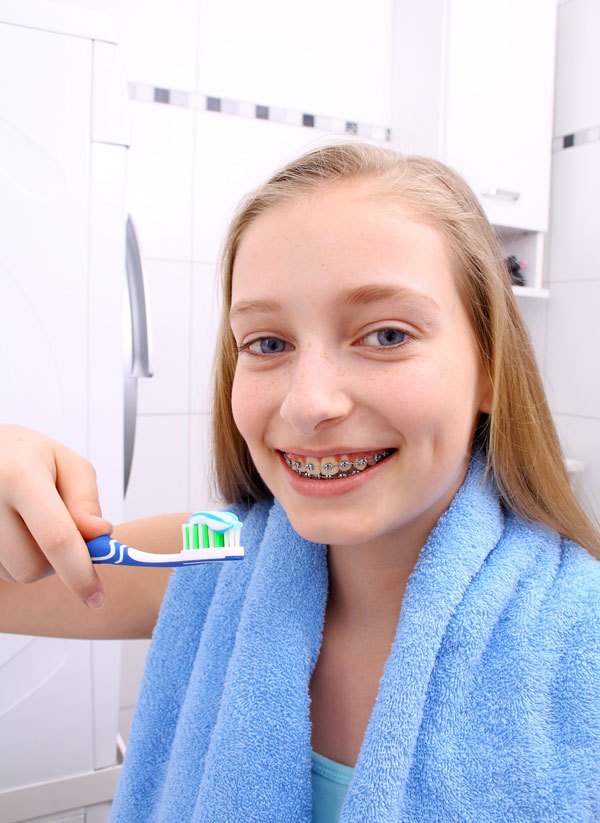Brushing your teeth when you’re wearing braces is just as important, if not more important, than brushing your teeth when you don’t have braces. It’s especially important because it can seem so difficult to do. So many of our patients simply brush their teeth as they always have, ignoring the fact that even the best toothbrush is not able to thoroughly clean around the brackets and wires, and that brushing your teeth without being careful of your brackets and wires can actually dislodge a wire or damage a bracket, which only protracts the treatment period.
Here are seven tips for making sure you are getting your teeth clean while wearing braces:
1. Find the right toothbrush.
The stiffer your bristles are, the better they remove plaque from your teeth, right? This is true when you’re not wearing braces, but while you have a brackets and wire in your both, stiff bristles are more likely to bend or bush a wire, as well as break a bracket off of a tooth.
A toothbrush with soft bristles is much safer the use and it will also be much better molding around your brackets, to clear away food debris and bacteria from this area. This also prevents your gums, which are usually already a little irritated from your braces, from becoming even more irritated.
2. Start without toothpaste.
This step is important, because it allows you to see what you’re doing much better than when you start off with toothpaste. The foaming action of most toothpaste can obscure your teeth and the brackets, so it will be difficult to see if everything is clean until you are done brushing. Starting off without toothpaste and cleaning around your brackets, and then adding a little bit of toothpaste to you brush to go over your teeth again is the best way to both get your teeth and brackets clean and get all of the benefits that toothpaste provides.
3. Pick, don’t scrub.
Especially when removing visible plaque or debris from around a wire or bracket, it’s important not to scrub.
This tip is difficult to remember, as most of us use a scrubbing motion when we clean our teeth without brackets. Picking is less likely to damage the bracket and is usually more effective when it comes to removing the gunk that can build up around our brackets and teeth every day. Especially when trying to clean under the wire between the brackets, don’t just scrub over the wire – try picking from underneath and above with the bristles of your brush.
4. Take enough time.
This is one of the most overlooked but important steps of getting your teeth clean.
You need to spend at least two minutes cleaning your teeth, especially when you have braces. Dedicate thirty seconds to each quarter of your mouth. Most people believe that they are brushing long enough, but few actually are. If you think you’re brushing for two full minutes, time yourself. If you are, great!
If you’re not brushing for the full amount of time, set up a timer and train yourself to dedicate two entire minutes to the process. This is extremely important for brushing both with and without braces, but especially when you do have braces, as brackets and wires provide lots of spaces for bacteria, acid, and food debris to hide.
5. Find the right toothpaste.
While we might recommend a specific brand or type of toothpaste, as more orthodontists or dentists do, the right brand of toothpaste for you is one that you’ll actually use. If you have a child who is particularly picky about the taste or type of toothpaste (whether it’s paste or gel), find one that he or she likes and won’t refuse to use.
While toothpaste does provide a number of benefits, how long you brush your teeth and how careful you are to hit every spot in your mouth is far more important than what kind of toothpaste you ultimately end up using. As long as it has fluoride, it will work perfectly if you take enough time.
6. Spit and rinse in the morning, spit, but don’t rinse at night.
Each person has their own routine, and while most people like to get the remaining foam out of their mouth in the morning before they start the day, it’s better for your teeth if you leave the foam in your mouth at night. You can spit out the extra, but don’t rinse whatever remaining fluoride is on your teeth out of your mouth. Especially while wearing braces, as this can help to strengthen and fortify teeth, and because the fluoride lingers in your mouth, it protects your teeth much longer than it would if you rinsed it out entirely.
7. Consider investing in some technology.
While there’s nothing wrong with a standard toothbrush and you can definitely get your teeth clean using one, an electric toothbrush is a great way to enhance your oral hygiene routine. The vibrating toothbrushes are usually better than the ones that rotate. There are even some brushes that include a built-in timer, which is great for those that usually don’t take enough time to brush. It’s important to note, however, that having a vibrating toothbrush should not be excuse to shorten your brushing time or to put less effort into it.
Brushing your teeth thoroughly at least every morning and every night is the best way to prevent cavities and other complications while wearing your braces. While braces are designed to improve your smile and bite, if you neglect your brushing routine, cavities, root canals, infections, and tooth decay and negate the benefits of braces—so stick to your brushing schedule and keep those teeth clean!




